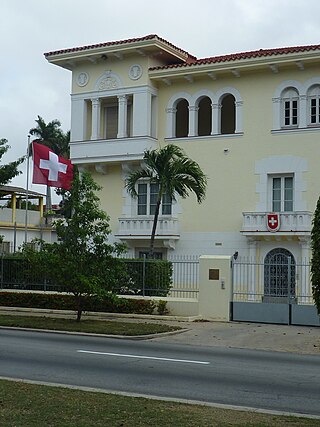
A diplomatic mission or foreign mission is a group of people from a state or organization present in another state to represent the sending state or organization officially in the receiving or host state. In practice, the phrase usually denotes an embassy or high commission, which is the main office of a country's diplomatic representatives to another country; it is usually, but not necessarily, based in the receiving state's capital city. Consulates, on the other hand, are smaller diplomatic missions that are normally located in major cities of the receiving state. As well as being a diplomatic mission to the country in which it is situated, an embassy may also be a nonresident permanent mission to one or more other countries.

The United States Department of State (DOS), or simply the State Department, is an executive department of the U.S. federal government responsible for the country's foreign policy and relations. Equivalent to the ministry of foreign affairs of other nations, its primary duties are advising the U.S. president on international relations, administering diplomatic missions, negotiating international treaties and agreements, and representing the U.S. at the United Nations. The department is headquartered in the Harry S Truman Building, a few blocks from the White House, in the Foggy Bottom neighborhood of Washington, D.C.; "Foggy Bottom" is thus sometimes used as a metonym.

The United States Foreign Service is the primary personnel system used by the diplomatic service of the United States federal government, under the aegis of the United States Department of State. It consists of over 13,000 professionals carrying out the foreign policy of the United States and aiding U.S. citizens abroad. Its current director general is Marcia Bernicat.
Diplomatic rank is a system of professional and social rank used in the world of diplomacy and international relations. A diplomat's rank determines many ceremonial details, such as the order of precedence at official processions, table seatings at state dinners, the person to whom diplomatic credentials should be presented, and the title by which the diplomat should be addressed.

The Interests Section of the Islamic Republic of Iran in the United States is a part of the Pakistani Embassy in Washington, D.C., and is the de facto consular representation of the Islamic Republic of Iran in the United States.

A consul is an official representative of a government who resides in a foreign country to assist and protect citizens of the consul's country, and to promote and facilitate commercial and diplomatic relations between the two countries.

A consulate is the office of a consul. A type of diplomatic mission, it is usually subordinate to the state's main representation in the capital of that foreign country, usually an embassy. The term "consulate" may refer not only to the office of a consul, but also to the building occupied by the consul and the consul's staff. The consulate may share premises with the embassy itself.

A protecting power is a country that represents another sovereign state- the protected power- in a third country where the protected power lacks its own formal diplomatic representation. It is common for protecting powers to be appointed when two countries break off diplomatic relations with each other. The protecting power is responsible for looking after the protected power's diplomatic property and citizens in the hosting state. If diplomatic relations were broken by the outbreak of war, the protecting power will also inquire into the welfare of prisoners of war and look after the interests of civilians in enemy-occupied territory.

Anatols Dinbergs was one of the preeminent career diplomats of Latvia. He entered service in Latvia's Foreign Ministry in 1932. Dinbergs remained abroad when the Soviet Union occupied Latvia, serving in the Latvian Legation in Washington, D.C., after World War II ended. Dinbergs assumed the highest diplomatic post, that of chargé d'affaires, in 1970 and represented Latvia's sovereign interests in exile until Latvia reestablished its independence in 1991. As head of the Latvian diplomatic service abroad, Dinbergs was appointed Latvia's first ambassador to the United Nations and subsequently Latvia's first ambassador to the United States. After retirement, he served as Counselor to the Latvian Embassy in Washington, D.C., until his death in 1993.








